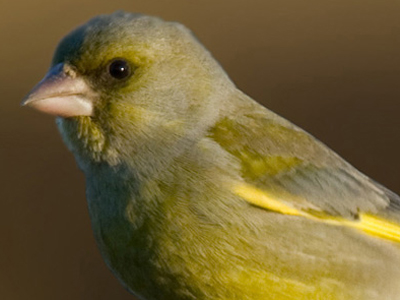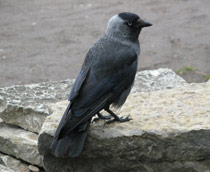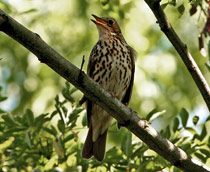
British Birds - Garden Birds 02 - Fairly Common
This quiz contains the birds that occupy positions 11 to 20 in "The Big Garden Birdwatch" of 2011. The event is organized by the RSPB each spring and gets people all over the country reporting on the birds in their garden. Can you tell the difference between a Crow and a Jackdaw? Find out below! Don't forget to click the pictures to appreciate the true brilliance of the bird's plumage.
To read more about the individual birds go to British Garden Birds where you will find a wealth of information on a friendly website dedicated to helping garden birdwatchers.
- Group: Tits
- Binomial: Parus ater
- Order: Passeriformes
- Family: Paridae
- Status: Resident Breeding Species
- The smallest tit in the whole of Europe
- Behaviour is similar to that of Blue tits but there is no blue in its plumage
- The surest way to distinguish the bird from other tits is by the white patch on the back of its neck
- Group: Long-tailed Tits
- Binomial: Aegithalos caudatus
- Order: Passeriformes
- Family: Aegithalidae
- Status: Resident Breeding Species
- Adult birds are predominatly pinkish-white
- The longest tail of any British bird in relation to its body
- Scientifically this is NOT in the same family as the Blue Tit and the Great Tit
- Group: Pigeons and Doves
- Binomial: Columba livia
- Order: Columbiformes
- Family: Columbidae
- Status: Resident, Most Birds Are Of Feral Origin
- A familiar site in towns and cities, pecking at scraps of food
- Descended from the Rock Dove but breeding with other types of pigeon and dove has resulted in great diversity
- Group: Crows and allies
- Binomial: Pica pica
- Order: Passeriformes
- Family: Corvidae
- Status: Resident Breeding Species
- From a distance looks jet black and gleaming white but closer up the black plumage radiates many different colours
- Sometimes gather together in groups known as "Parliaments"
- Sometimes eats the eggs of other birds
- Group: Accentors
- Binomial: Prunella modularis
- Order: Passeriformes
- Family: Prunellidae
- Status: Resident Breeding Species
- Also known as Hedge Sparrow
- Intricate light and dark brown markings
- Adults have some grey on their heads but this is absent in young birds
- Its movements are altogether more agitated than house sparrows
- Group: Crows and allies
- Binomial: Corvus monedula
- Order: Passeriformes
- Family: Corvidae
- Status: Resident Breeding Species
- The smallest member of the Crow family
- In flight it has faster wing beats than Rooks and Carrion Crows
- Loves shiny objects and is prone to stealing jewels and rings left unattended outside
- Group: Thrushes
- Binomial: Turdus philomelos
- Order: Passeriformes
- Family: Turdidae
- Status: Resident Breeding Species
- Easily confused with young and female Blackbirds
- Does not stand as upright at Blackbirds and Mistle Thrushes
- Has warm brown upper parts and paler underparts with small dark spots
- Group: Wren
- Binomial: Troglodytes troglodytes
- Order: Passeriformes
- Family: Troglodytidae
- Status: Resident Breeding Species
- Tiny birds that weigh about the same as a £1.00 coin
- Forever twitching and moving around
- Tail sticks out from the body at an oddly twisted angle
- Very loud voice for such a small bird
- Group: Finches
- Binomial: Carduelis chloris
- Order: Passeriformes
- Family: Fringillidae
- Status: Resident Breeding Species
- The vivid green and yellow plumage on adult birds tends to fade in winter
- Young birds are rather dull looking and can easily be mistaken for Sparrows
- Loves to pick the peanuts and sunflower seeds from birdtables
- Group: Crows and allies
- Binomial: Corvus corone
- Order: Passeriformes
- Family: Corvidae
- Status: Resident Breeding Species
- Larger than a Jackdaw but smaller than a Raven
- Look for feathers around the base of its beak to distinguish it from a Rook
- Remember "If you see more than two Crows together they are Rooks"!
Ready for more?
not all...
quizzers. Try to win a coveted spot on our Hall of Fame Page.

















